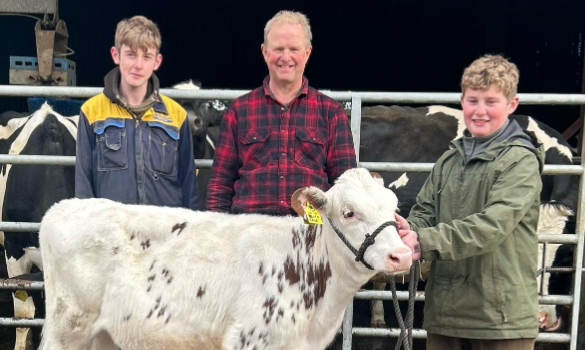
Farmer Focus: D Blanch, Gloucestershire
The Blanch family have farmed at Poplar Farm, Gloucestershire for over 400 years, and is now under the management/proprietorship of David Blanch and his family. Home to the Latteridge pedigree Holstein herd, the farm covers 250 acres with over half in grass, and the rest divided between maize and wheat. The Cattle Information Service has provided milk recording and health testing services to the herd since 2017.
The all-year-round calving herd of 105 head is reaching 9,785 litres at 4.17% Butterfat and 3.43% Protein with a calving interval of 381 days. Their milk is sold to chocolate manufacturer Cadbury, who are looking for a level annual forecast and good constituents. The herd graze out during the day in the summer months, in addition to a TMR diet comprising of maize and grass silage, blend and crimped wheat and topped up in the parlour to yield.
Milked in a herringbone 12:12 parlour, David does the majority of the milkings, with the assistance of a relief milker two afternoons a week and a part-time tractor driver. His two young teenage sons, Oliver and George, are showing interest in the dairy herd and are often out helping on the farm.
They breed the majority of their own replacements with the addition of the occasional special purchase from a dispersal sale to introduce a new family to the herd. Everything is served twice to sexed semen, with anything returned to service to British Blue, with these calves being sold at the local market at around 30 days.
The Holstein Complete service is utilised to maximise the benefits for the Latteridge Herd, milk recording monthly, classifying twice a year and registering all pedigree female calves for a single monthly fee. The milk recording data aids David in pinpointing any high cell count cows so he can start treating them straight away.
Classification scores are used when deciding on which of the herd to breed from, David finds that the Excellent and VG scored cows generally stay in the herd longer than lower-scored animals. The herd returned to being pedigree when David left school to work on the farm, his interest in pedigrees is still as strong today as it was then. David says “Bulling heifers I sell out of my better-classified animals definitely sell for higher at the market which proves the value of pedigree is still recognised”. Being located in a TB hotspot, the higher compensation amounts were also a factor in becoming pedigree.
David finds having the CIS MobileHerd app on his phone extremely useful, being able to register calves and apply for passports in one step whilst out on the farm ensures they are quickly done and saves duplicating the entry of the information. He also uses the YourHerd management programme when doing his health plans with his vet. The herd is routinely tested for Johnes, BVD, IBR and Lepto quarterly through CIS.
It is hoped that the herd could expand in the future, however, David is concerned about the new slurry regulations coming in and the cost of keeping compliant.
-ends-
